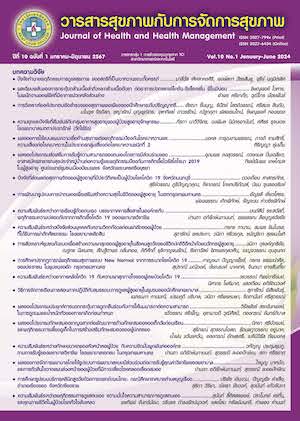Relationship Between Self-Care Behavior, Confidence in One’s Ability to Perform Self-Care, and Quality of Life in Patients with Heart Failure
Keywords:
Self-care Behavior, Confidence in one’s ability, Quality of Life, Heart FailureAbstract
This study is a Correlation Research. The purpose of the study were 1) to evaluate the level of development of the quality of life, self-care behavior, and confidence in one’s ability to perform self-care among patients with heart failure 2) to study the relationship between self-care behavior, confidence in one’s ability to perform self-care, and the quality of life among patients with heart failure. The samples were comprised of a purposive sampling of 64 patients receiving care at internal medicine and specialized clinics of the Rajavithi hospital from August to October 2023. The research instruments consisted of personal data record form, the self-care of heart failure index version 7.2 (SCHFI – Thai v. 7.2), Confidence in one’s ability to perform self-care, and Minnesota Living with Heart Failure Questionnaire (MLHFQ) with reliability Cronbach Alpha of .73, .95 and .96 respectively. The statistics used to analyze data were Descriptive statistics and Pearson’s correlation coefficient. The research results were 1. The mean score for overall of the quality of life of patients with heart failure was poor ( = 45.59, SD = 21.25). The mean score of the self-care behavior of patients with heart failure was fair (
= 68.91, SD = 13.47). The mean score of confidence in one’s ability to perform self-care was also fair (
= 66.72, SD = 19.85) 2. The quality of life of patients with heart failure statistically significant low-level (r < 30) related to self-care behavior and confidence in one’s ability to perform self-care (r = .28, p <.05 and r = .27, p <.05) respectively.
References
กิติพงษ์ พินิจพันธ์, และสุนิดา ปรีชาวงษ์. (2564). ปัจจัยทำนายการดูแลตนเองของผู้ป่วยภาวะหัวใจล้มเหลวในเขตภาคกลาง ประเทศไทย. วารสารวิจัยสุขภาพและการพยาบาล, 38(3), 48-60.
บุญใจ ศรีสถิตย์นรากูร. (2553). ระเบียบวิธีการวิจัยทางการพยาบาลศาสตร์ (พิมพ์ครั้งที่ 5). กรุงเทพฯ: ยูแอนด์ไอ อินเตอร์มีเดีย.
วรินธร ดำรงรัตน์นุวงศ์. (2564). SCHFI Thai version 7.2. สืบค้นจาก https://self-care-measures.com/project/patient-version-schfi-thai-2-2/
Bandura, A. (1997). Self-efficacy: The exercise of control. New York: W.H. Freeman and Company.
Baradaranfard, F., Babaei, S., Boroumand, S., Mosleh, S., Jafari, F., & Binaee, N. (2018). The relationship between quality of life and cardiovascular self-efficacy in patients with heart failure: A descriptive correlation study. Jundishapur Journal of Chronic Disease Care, 7(4), e68431. doi:10.5812/jjcdc.68431
Bilbao, A., Escobar, A., García-Perez, L., Navarro, G., & Quirós, R. (2016). The Minnesota living with heart failure questionnaire: comparison of different factor structures. Health and quality of life outcomes, 14, 1-11.
Members, W. C., Bozkurt, B., Ahmad, T., Alexander, K. M., Baker, W. L., Bosak, K., ... & Ziaeian, B. (2023). Heart failure epidemiology and outcomes statistics: a report of the Heart Failure Society of America. Journal of cardiac failure, 29(10), 1412-1451. doi:10.1016/j.cardfail.2023.07.006
Faul, F., Erdfelder, E., Buchner, A., & Lang, A. G. (2009). Statistical power analyses using G* Power 3.1: Tests for correlation and regression analyses. Behavior research methods, 41(4), 1149-1160. doi:10.3758/BRM.41.4.1149
Hashimoto, S., Kitakata, H., Kohsaka, S., Fujisawa, D., Shiraishi, Y., Nakano, N., ... & Kohno, T. (2023). Confidence in self-care after heart failure hospitalization. Journal of Cardiology, 81(1), 42-48.
Jiang, F., Lin, Y., Li, S., Peng, Y., Huang, X., & Chen, L. (2022). A Study of the Nursing Intervention Based on Self-Efficacy Theory for Patients After Mechanical Heart Valve Replacement: A Randomized Controlled Trial. International Journal of General Medicine, 15, 6539-6547. doi:10.2147/IJGM.S353977
Marx, N., Federici, M., Schütt, K., Müller-Wieland, D., Ajjan, R. A., Antunes, M. J., ... & Sattar, N. (2023). 2023 ESC Guidelines for the management of cardiovascular disease in patients with diabetes: Developed by the task force on the management of cardiovascular disease in patients with diabetes of the European Society of Cardiology (ESC). European heart journal, 44(39), 4043-4140. doi:10.1093/eurheartj/ehad192
Moshki, M., Khajavi, A., Vakilian, F., Minaee, S., & Hashemizadeh, H. (2019). The content comparison of health-related quality of life measures in heart failure based on the international classification of functioning, disability, and health: a systematic review. Journal of cardiovascular and thoracic research, 11(3), 167-175.
Riegel, B., Barbaranelli, C., Carlson, B., Sethares, K. A., Daus, M., Moser, D. K., ... & Vellone, E. (2019). Psychometric testing of the revised self-care of heart failure index. Journal of Cardiovascular Nursing, 34(2), 183-192.
Şabanoğlu, C., Sinan, Ü. Y., Akboğa, M. K., Çoner, A., Gök, G., Kocabaş, U., ... & Zoghi, M. (2023). Long-term prognosis of patients with heart failure: Follow-up results of journey HF-TR study population. Anatolian journal of cardiology, 27(1), 26-33.
Schulz, M., Griese-Mammen, N., Schumacher, P. M., Anker, S. D., Koehler, F., Ruckes, C., ... & Laufs, U. (2020). The impact of pharmacist/physician care on quality of life in elderly heart failure patients: results of the PHARM-CHF randomized controlled trial. ESC Heart Failure, 7(6), 3310-3319. doi:10.1002/ehf2.12904
Seid, M. A. (2020). Health-related quality of life and extent of self-care practice among heart failure patients in Ethiopia. Health and Quality of Life Outcomes, 18(1), 27. doi:10.1186/s12955-020-01290-7
Sen, H. T. N., Linh, T. T. T., & Trang, D. T. K. (2020). Factors related to treatment compliance among patients with heart failure. Ramathibodi Medical Journal, 43(2), 30-40.
Tangsatitkiat, W., & Sakthong, P. (2010). Thai version of the Minnesota Living with Heart Failure Questionnaire: psychometric testing using a longitudinal design. Asian Biomedicine, 4(6), 877-884.
Ziaeian, B., & Fonarow, G. C. (2016). Epidemiology and aetiology of heart failure. Nature Reviews Cardiology, 13(6), 368-378.
Downloads
Published
How to Cite
Issue
Section
License
Copyright (c) 2024 Journal of health and health management

This work is licensed under a Creative Commons Attribution-NonCommercial-NoDerivatives 4.0 International License.




